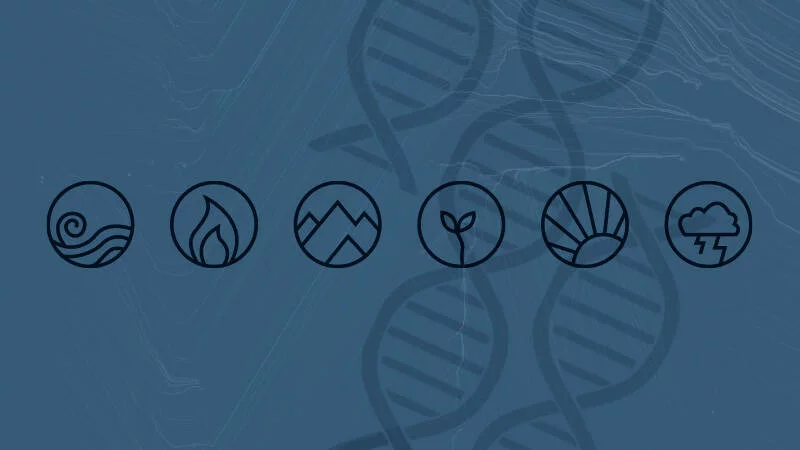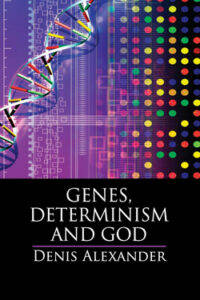Why is it that I am the way I am? This is a question we all face eventually. Sometimes it will arise at the outset of life, when a young person considers their gifts, talents, interests, and formation while reflecting on vocation. For others, the question echoes around the empty house during retirement as they wonder why things happened the way they did. If all research is at some level “me-search,” then I suspect that this is also the question driving much of Denis Alexander’s remarkable book Genes, Determinism and God.
But I might recommend that a better title to the book could have been Genes, God, and Determinism. Alexander primarily explores determinism. When addressing the question, ‘Do our genes determine our characteristics and behaviors?’ Dr. Alexander persuasively (and overwhelmingly) answers: No. But when turning to the second question suggested by the title, ‘Does God determine our characteristics and behaviors?’ he offers a much less robust: No.
Dr. Alexander engages in remarkable scientific detail across a broad range of disciplines to definitively dispatch the notion of genetic determinism. Biologically, we are each shaped by a vast set of inputs. Our genes are an important node in a web that includes our microbiota, physiology, diet, environment, community, relationships, and more. Instead of being determined by our genes, Alexander argues that we are shaped by this collection of inputs that he summarizes with the useful acronym DICI (Developmental Integrated Complementary Interactionism).
Determinism and My Current Cholesterol
We can work out the implications for DICI by considering a relatively clear biological question from my own life: Why do I have the blood cholesterol that I do? First, the answer is developmental. My current blood cholesterol is a snapshot of a value that changes throughout life (and even before birth).Link. Blood cholesterol changes in response to blood hormones particularly during pubertyLink. By middle age, the value is influenced by my current body shape and it will continue to respond to my (eventual) loss of muscle mass and (continual) reduction in metabolic rates.
My current blood cholesterol is also integrated. It is a response to the genes I inherited from my parents, whether those be conducive to low cholesterol (as Alexander describes on p.271) or high cholesterolLink. which is more likely to be the case for me. But the value is not set by my genes, instead the value is an integrated response to a host of inputs including genes but also my diet (pretty good) and exercise (regular). No single factor determines my blood cholesterol.
The complementary interactionism is revealed in how these various factors work together. I might argue that there is no such thing as a ‘gene for high cholesterol’ while recognizing that some genes could lead to high cholesterol given a certain diet and lifestyle. This may be true for other genes some people carry that seem to predispose them to conditions like diabetes. Since some of these genes are normal among our closest evolutionary relatives (chimpanzees), it may be that what we see as ‘disease causing’ genes are in actuality genes that are poorly adapted to our sedentary and high-calorie lifestyles. My genes, diet, and lifestyle work together with a range of other inputs (including the fact that like 25% of Americans over 40 I take a statin dailyLink. to produce my final blood cholesterol. Or at least what it is today.
Determinism and Vocation
The concept of DICI can also be applied to significantly more complex traits, like, “Why do I study science?” The answer is undeniably complicated and clearly I do not carry the “pursue a career in science” gene. The process was developmental. There were opportunities, experiences, and people that together encouraged, enabled, and empowered me in a career in science. It was integrated. No single teacher, scientific tidbit, letter of recommendation, or moment of wonder made me a scientist. The product is the result of all these working together in a complementary set of interactions. A wonderful teacher saw potential in me and invested in me until I saw it too.The answer is undeniably complicated and clearly I do not carry the “pursue a career in science” gene. The process was developmental. A silly animation showed how DNA replication could work and I have never stopped wanting to know more about how those machines carry out their tasks. A professor had the courage and compassion needed to tell me that my personal statement for graduate school was terrible. I was willing to rewrite the statement because I wanted to know more about the video and I was willing to sit in the professor’s office to hear his criticism because of my relationship with the high school teacher. Developmental Integrated Complementary Interactionism.
Alexander’s offering of DICI to explain how genes (and the rest of biology) work together to shape our characteristics is rich, detailed, and awe inspiring. Unfortunately, he provides much less in describing ‘why we are the way we are’ theologically. He provides a useful discussion of the image of God, but largely ignores the idea of divine determinism. Is there true freedom or openness to the future in creation? Or, did God give me high cholesterol or make me study science?
Determinism and Divine Action
I find this omission a disappointment because I think Alexander’s acronym DICI might be a valuable starting point for evaluating how God shapes us. God’s work is clearly developmental.God works through innumerable moments that are integrated together to form who we are. God is working on us individually, corporately, and cosmically through a long and sustained process. The Creator God has been shaping life on Earth for 4,000,000,000 years and he has been shaping me for 40. God’s work is not done. Instead I, we, and the universe are always in the act of becoming something new. God is working, has worked, and will work through a developmental process.
God’s work is also integrated. We are each the sum of an array of inputs that God has used to guide our lives. The words of wisdom from a trusted friend, the small whisper during a time of prayer, the unexplainable confidence in the face of a hard decision, the rejection letter, the unexpected encounter . . . God works through innumerable moments that are integrated together to form who we are.
And clearly these various events, stretched out over the developmental course of our lives, display complementary interactionism. God shapes the church through the power of the Holy Spirit, the Scriptures, the long Christian tradition, and the wisdom of the body of Christ as it exists, globally, today. God shapes me through those same inputs and the many people and experiences he has brought into my life.
What may be most remarkable is that God chooses to use us as inputs to shape the world. What God could do alone, he invites us take up with him. When the power of the Holy Spirit lacks nothing, he empowers us to advance the Kingdom of God. God chooses to work together with us in ways that are developmental, integrated, and an example of complementary interactionism. We are called to work with the Holy Spirit and God’s church to advance the work of righteousness in God’s world.
Whether biologically or theologically, the answer is that we are not determined at all. Biologically, freedom from genetic determinism invites us to care for our environments, consider our microbiota, nurture our relationships, and discern our diets because these all interact with our genomes to shape our identities. Theologically, DICI provides a framework for considering the complicated topic of providence and divine action.Link.
Alexander offers in Genes, Determinism and God a book that can be intimidating in scope and depth, but through its pages is able systematically to dismantle the myth of genetic determinism. In its key acronym of DICI it also offers important new insights into the great question of, “Why is it that I am the way I am?”








Comments
Be the first one to make a comment!